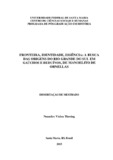| dc.creator | Thesing, Neandro Vieira | |
| dc.date.accessioned | 2016-02-23 | |
| dc.date.available | 2016-02-23 | |
| dc.date.issued | 2015-04-22 | |
| dc.identifier.citation | THESING, Neandro Vieira. FRONTIER, IDENTITY,ESSENCE: THE SEARCH OF RIO GRANDE DO SUL ORIGINS IN GAÚCHOS E BEDUÍNOS, OF MANOELITO DE ORNELLAS. 2015. 124 f. Dissertação (Mestrado em História) - Universidade Federal de Santa Maria, Santa Maria, 2015. | por |
| dc.identifier.uri | http://repositorio.ufsm.br/handle/1/9666 | |
| dc.description.abstract | In 1948, Manoelito of Ornellas published his work Gauchos and Bedouins: ethnicity
and the social formation of Rio Grande do Sul, inserting himself in the debates on the
(re)formulation of regional identity carried out in the mid-twentieth century in the state. At that
time, disputes involving the legitimate past and what is and how to be gaucho took new turns,
different from those born with the creation of IHGRS and the "official line". Both history as
discipline and the social actors involved changed. In this research, we try to demonstrate the
transformation that occurred and how the work and the author fit into the heart of this process.
For this, the dissertation is divided into three chapters In the first, will be addressed the relations
of the author and his work with their contexts, especially the historiographical culture of Rio
Grande do Sul and the debates around the regionalist literature, tradition in which he was
inserted as an intellectual. The second chapter takes place a mixture of biography and
intellectual biography, paying attention to the trajectory of Manoelito in seek of grants to interrelate
their written production. In the third and last is performed an internal review of Gauchos
and Bedouins, trying to understand their epistemological assumptions, notions and central
representations builded, his dialogue with the historiographical culture of the period and the
insertion in the debate on the identity (re)construction during the publication period. The
research is linked to the Research Field Integration, Politic and Frontier of the PPGH-UFSM
and was funded by a CAPES/FAPERGS scholarship. | eng |
| dc.description.sponsorship | Fundação de Amparo a Pesquisa no Estado do Rio Grande do Sul | |
| dc.format | application/pdf | por |
| dc.language | por | por |
| dc.publisher | Universidade Federal de Santa Maria | por |
| dc.rights | Acesso Aberto | por |
| dc.subject | Manoelito de Ornellas | por |
| dc.subject | Gaúchos e Beduínos | por |
| dc.subject | Historiografia | por |
| dc.subject | Historiografia sul-rio-grandense | por |
| dc.subject | Gauchos and bedoins | eng |
| dc.subject | Historiography | eng |
| dc.subject | Historiography fo Rio Grande do Sul | eng |
| dc.title | Fronteira, identidade, essência: a busca das origens do Rio Grande do Sul em Gaúchos e Beduínos, de Manoelito de Ornellas | por |
| dc.title.alternative | Frontier, identity,essence: the search of Rio Grande do Sul origins in Gaúchos e Beduínos, of Manoelito de Ornellas | eng |
| dc.type | Dissertação | por |
| dc.description.resumo | Em 1948, Manoelito de Ornellas publicou sua obra Gaúchos e Beduínos: a origem
étnica e a formação social do Rio Grande do Sul, inserindo-se nos debates sobre a
(re)formulação da identidade regional levadas a cabo em meados do século XX no estado.
Naquele momento, as disputas envolvendo o passado legítimo e os sentidos do ser gaúcho
tomaram novos rumos, distintos daqueles nascidos com a criação do IHGRS e o "discurso
oficial". Tanto a história disciplinar quanto os atores sociais envolvidos mudaram. Busca-se
demonstrar as transformações ocorridas e como obra e autor inserem-se no âmago desse
processo. Para isso, a dissertação divide-se em três capítulos. No primeiro, serão abordadas as
relações do autor e sua obra com seus contextos, principalmente a cultura historiográfica sulrio-
grandense e os debates em torno da literatura regionalista, tradição de pensamento na qual
se inseriu como intelectual. No segundo capítulo, realiza-se uma mescla de biografia e biografia
intelectual, atentando para a trajetória de Manoelito e buscando subsídios para inter-relacionar
sua produção escrita. No terceiro e último, é realizada uma análise interna de Gaúchos e
Beduínos, procurando compreender seus pressupostos epistemológicos, as noções e
representações centrais construídas, o diálogo com a cultura historiográfica do período e a
inserção nos debates sobre a (re)construção identitária local durante o período de publicação.
A pesquisa vincula-se à Linha de Pesquisa Integração, Política e Fronteira do PPGH-UFSM e
foi realizada com auxílio de bolsa CAPES/FAPERGS. | por |
| dc.contributor.advisor1 | Armani, Carlos Henrique | |
| dc.contributor.advisor1Lattes | http://lattes.cnpq.br/3735821554238929 | por |
| dc.contributor.referee1 | Biasoli, Vitor Otávio Fernandes | |
| dc.contributor.referee1Lattes | http://buscatextual.cnpq.br/buscatextual/visualizacv.do?id=K4794806J2 | por |
| dc.contributor.referee2 | Nedel, Letícia Borges | |
| dc.contributor.referee2Lattes | http://lattes.cnpq.br/1788582114469723 | por |
| dc.creator.Lattes | http://lattes.cnpq.br/7922207971381783 | por |
| dc.publisher.country | BR | por |
| dc.publisher.department | História | por |
| dc.publisher.initials | UFSM | por |
| dc.publisher.program | Programa de Pós-Graduação em História | por |
| dc.subject.cnpq | CNPQ::CIENCIAS HUMANAS::HISTORIA | por |


